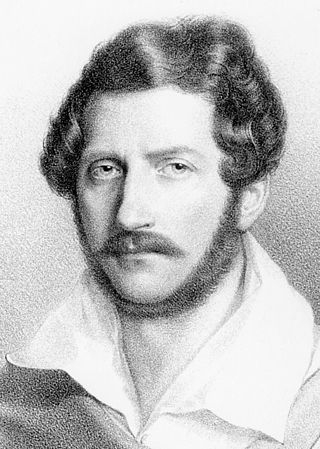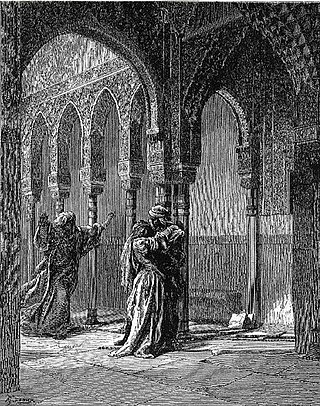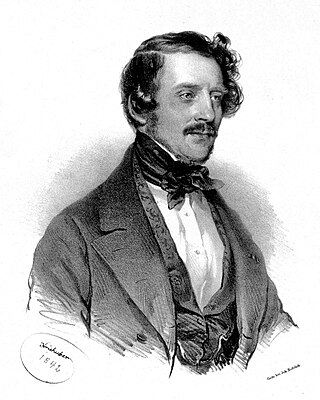
Le convenienze ed inconvenienze teatrali, also known as Viva la mamma and Viva la Diva, is a dramma giocoso, or opera, in two acts by Gaetano Donizetti. The Italian libretto was written by Domenico Gilardoni, adapted from Antonio Simeone Sografi's plays Le convenienze teatrali (1794) and Le inconvenienze teatrali (1800).

Il campanello or Il campanello di notte is a dramma giocoso, or opera, in one act by Gaetano Donizetti. The composer wrote the Italian libretto after Mathieu-Barthélemy Troin Brunswick and Victor Lhérie's French vaudeville La sonnette de nuit. The premiere took place on 1 June 1836 at the Teatro Nuovo in Naples and was "revived every year over the next decade".

Ugo, conte di Parigi is a tragedia lirica, or tragic opera, in two acts by Gaetano Donizetti. Felice Romani wrote the Italian libretto after Hippolyte-Louis-Florent Bis's Blanche d'Aquitaine. It premiered on 13 March 1832 at La Scala, Milan.

Il diluvio universale is an azione tragico-sacra, or opera, by Gaetano Donizetti. The Italian libretto was written by Domenico Gilardoni after Lord Byron's Heaven and Earth and Francesco Ringhieri's tragedy Il diluvio (1788).

Zoraida di Granata is a melodramma eroico, in two acts by Gaetano Donizetti. The Italian libretto had been partly prepared by Bartolomeo Merelli, based on the French play, Gonzalve de Cordoue ou Grenade Reconquise by Jean-Pierre Claris de Florian (1791), and on a libretto by Luigi Romanelli to an opera by Nicolini called Abenamet e Zoraide.

Maria de Rudenz is a dramma tragico, or tragic opera, in three parts by Gaetano Donizetti. The Italian libretto was written by Salvadore Cammarano, based on "a piece of Gothic horror", La nonne sanglante by Auguste Anicet-Bourgeois and Julien de Mallian, and The Monk by Matthew Gregory Lewis. It premiered at La Fenice in Venice, on 30 January 1838.

Maria Padilla is a melodramma, or opera, in three acts by Gaetano Donizetti. Gaetano Rossi and the composer wrote the Italian libretto after François Ancelot's play. It premiered on 26 December 1841 at La Scala, Milan. The plot is loosely based on the historical figure María de Padilla, the mistress of Pedro the Cruel, King of Castile.

Torquato Tasso is a melodramma semiserio, or "semi-serious" opera, in three acts by Gaetano Donizetti and based on the life of the great poet Torquato Tasso. The Italian libretto was written by Jacopo Ferretti, who used a number of sources for his text, including works by Giovanni Rosini, Goethe, Goldoni and Lord Byron, as well as Tasso's actual poetry. It premiered on 9 September 1833 at the Teatro Valle, Rome.

Deux Hommes et une femme, also known as Rita, is an opéra comique in one act, composed by Gaetano Donizetti to a French libretto by Gustave Vaëz. The opera, a domestic comedy consisting of eight musical numbers connected by spoken dialogue, was completed in 1841. Never performed in Donizetti's lifetime, it premiered posthumously at the Opéra-Comique in Paris on 7 May 1860.

Gabriella di Vergy is an opera seria in two acts by Gaetano Donizetti written in 1826 and revised in 1838, from a libretto by Andrea Leone Tottola, which was based on the tragedy Gabrielle de Vergy (1777) by Dormont De Belloy. Prior to that, the play was itself inspired by two French medieval legends, Le châtelain de Coucy et la dame de Fayel and Le Roman de la chastelaine de Vergy.

Imelda de' Lambertazzi is a melodramma tragico or tragic opera in two acts by Gaetano Donizetti from a libretto by Andrea Leone Tottola, based on the tragedy Imelda by Gabriele Sperduti. It received its first performance on 5 September 1830 at the Teatro San Carlo, Naples.

Gianni di Calais is a melodramma semiserio, a "semi-serious" opera in three acts by Gaetano Donizetti (1828), from a libretto by Domenico Gilardoni, based on Jean de Paris by Louis-Charles Caigniez.

Gianni di Parigi is an 1839 melodramma comico in two acts with music by Gaetano Donizetti to a libretto by Felice Romani, which had previously been set by Francesco Morlacchi in 1818 and by Giovanni Antonio Speranza in 1836.

La zingara is an opera semiseria in two acts by Gaetano Donizetti, set to a libretto by Andrea Leone Tottola after La petite bohémienne by Louis-Charles Caigniez, which was itself derived from a work of August von Kotzebue.

Sancia di Castiglia is an Italian opera seria in two acts by Gaetano Donizetti to a libretto by Pietro Salatino. It was first performed at the Teatro San Carlo in Naples on 4 November 1832, conducted by Nicola Festa.

Don Gregorio is an 1826 opera by Gaetano Donizetti from a libretto by Jacopo Ferretti and adapted from his popular 1824 opera buffa L'ajo nell'imbarazzo, which had enjoyed considerable success when presented at the Teatro Valle in Rome on 4 February 1824.

Il giovedì grasso is a farsa in one act by Gaetano Donizetti, from a libretto by Domenico Gilardoni. The literal translation of the title is "Fat Thursday", a reference to Carnival celebration. The libretto was adapted from the French comedies Monsieur de Pourceaugnac by Molière and Le nouveau Pourceaugnac by Charles-Gaspard Delestre-Poirson and Eugène Scribe. The opera uses spoken dialogue rather than recitatives, and the buffo role is given in the Neapolitan language. The work premiered at the Teatro del Fondo in Naples on 26 February 1829.

Una follia is a farsa in one act by composer Gaetano Donizetti. The work premiered on 15 December 1818 at the Teatro San Luca in Venice. The opera uses the same Italian-language libretto by Bartolomeo Merelli after August von Kotzebue's Der Graf von Burgund that Donizetti used for his Enrico di Borgogna a month earlier, but with different music. It was given one performance and "never performed again, and its score has never been found."

La lettera anonima is a farce in one act composed by Gaetano Donizetti in 1822 to a libretto by Giulio Genoino, a former monk and the official censor of the Kingdom of the Two Sicilies. Genoino based his libretto on his own farce which, in turn, had been based on Mélite, ou Les fausses lettres by Pierre Corneille in 1630.

Il paria is an opera in two acts by Gaetano Donizetti from a libretto by Domenico Gilardoni, based on Le Paria by Casimir Delavigne and Michele Carafa's Il paria with a libretto by Gaetano Rossi.






